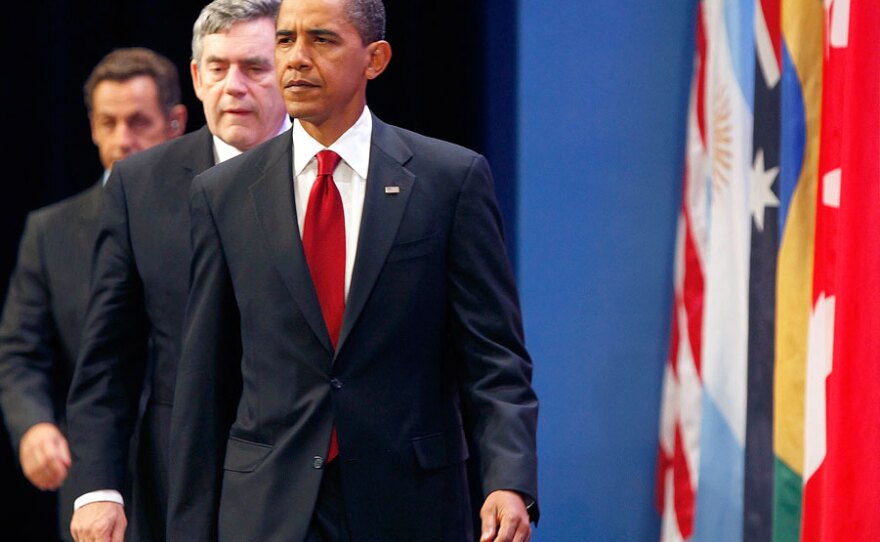President Obama on Friday warned Iran that it is "on notice" and faces international condemnation — and perhaps confrontation — if it continues to work on a previously secret nuclear facility.
"The choice they make over the next several weeks and months could well determine their ability to rejoin the international community," Obama said during a late afternoon news conference at the close of the G-20 economic summit in Pittsburgh.
And though Obama said he preferred a diplomatic solution to Iran's apparent violation of international nonproliferation rules, he did not rule out military action.
"I've always said that we do not rule out any options when it comes to [United States] security," Obama said. "But the preferred action is to resolve this in diplomatic action."
If diplomacy doesn't work, he said, "other consequences might follow." Leaders from six countries, including the United States, are scheduled to meet with Iranian officials Oct. 1 in Geneva to discuss Iran's nuclear enrichment program.
The president also cited what he called an "unprecedented show of unity" among international leaders — including those from China and Russia — that Iran's actions had raised "grave doubts" about whether it was developing a nuclear program for "peaceful purposes."
Other news out of the summit had been subsumed by the fast-developing story of Iran's covert construction of a nuclear facility in the Shiite Muslim holy city of Qum.
Friday opened with a surprise morning news conference, during which Obama and the leaders of France and Great Britain accused Iran of covertly building a nuclear fuel plant. They issued warnings of its consequences.
At that news conference, Obama asserted that Iran is "breaking rules that all nations must follow," and French President Nicolas Sarkozy raised the specter of sanctions against Iran unless it complies with international nonproliferation rules in the next two months.
Iran responded by confirming that it was building a "semi-industrial enrichment fuel facility," a project that U.S. officials say they had been tracking for years.
In anticipation of a confrontation over the facility, Iran on Monday reported to the International Atomic Energy Agency that it was engaged in a "pilot project" to enrich fuel, but that no nuclear material was present at the facility.
Iranian President Mahmoud Ahmadinejad, in an interview with Time magazine, characterized as "a mistake" Obama's assertions about Iran's nuclear efforts.
"We have no secrecy," he said in the interview. "We work within the framework" of the IAEA.
The Way Ahead In Afghanistan
At the afternoon news conference, Obama also was pressed on how he planned to proceed militarily in Afghanistan.

Acknowledging the public's weariness with the war, Obama said that his overriding goal remains dismantling the al-Qaida network and establishing stability in Afghanistan and Pakistan.
"After several years of drift" in Afghanistan, he said, "it's important to examine our strategies." But much of the success going forward, he said, is linked to Afghans' ability to provide for themselves and their own military training, and the ability of Afghanistan's government to deliver leadership and security.
"This is not easy," he said. "I would expect that the public would ask some very tough questions, and that's exactly what I'm doing."
Obama has been under increasing scrutiny over his intentions in Afghanistan following the leak of a military assessment by his top commander in that country that advocated for a troop surge.
The president has indicated he intends to wait until the disputed Afghan presidential election is resolved before settling on a way forward.
The White House earlier Friday issued a statement reporting that Obama and British Prime Minister Gordon Brown had met and "discussed Britain and the United States' shared interest in Afghanistan and ensuring it could never again be used for attacks by al Qaeda against the United Kingdom, the United States or our allies."
G-20 News Overlooked?
Obama's afternoon news conference had been intended to tout the G-20's progress at stabilizing the world financial system after a historic crisis, and the move away from 30-plus years of world economic order dominated by Western economic powerhouses known as the Group of Eight.
The president has pushed for the shift, arguing that countries like Brazil, China, India and South Africa with dynamic, rapidly expanding economies deserve a say in international conversations.
A statement released by the White House says: "This decision brings to the table the countries needed to build a stronger, more balanced global economy, reform the financial system, and lift the lives of the poorest."
It is a move, however inevitable, that was not without its critics in Europe. They include Italian Prime Minister Silvio Berlusconi, who is concerned about the Continent's waning international economic influence.
Obama lauded progress made at the summit on several fronts. Leaders agreed that banks should be better capitalized and bankers' pay curtailed, though no specific limits were set. And they reached consensus on a plan that would reduce carbon emissions by phasing out $300 billion in global subsidies for fossil fuel production and consumption.
The leaders also endorsed an effort to lessen trade imbalances between countries including the United States and China.
And Obama gave the G-20 leaders credit for earlier actions that prevented international economic "catastrophe."
"We brought the global economy back from the brink," he said, crediting an international stimulus package the group approved earlier as the "turning point" in calming the world's economic free fall.
A 19-page "Leaders' Statement" issued late Friday afternoon lauded economic progress it says the countries had made because of action taken at their last meeting in April. But warned that "a sense of normalcy should not lead to complacency."
"The process of recovery and repair remains incomplete," it says, with high unemployment still bedeviling many countries and "conditions for recovery of private demand not yet fully in place."
Copyright 2022 NPR. To see more, visit https://www.npr.org. 9(MDAzMjM2NDYzMDEyMzc1Njk5NjAxNzY3OQ001))







